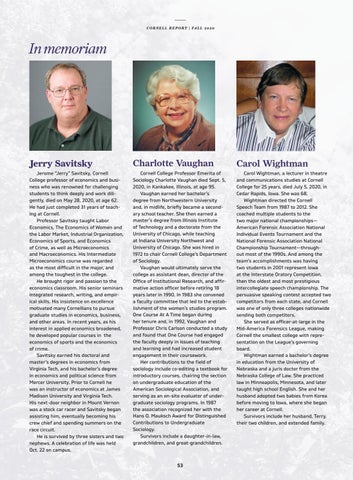C O R N E L L R E P O RT | FA L L 2 0 2 0
In memoriam
Jerry Savitsky
Charlotte Vaughan
Carol Wightman
Jerome “Jerry” Savitsky, Cornell College professor of economics and business who was renowned for challenging students to think deeply and work diligently, died on May 28, 2020, at age 62. He had just completed 31 years of teaching at Cornell. Professor Savitsky taught Labor Economics, The Economics of Women and the Labor Market, Industrial Organization, Economics of Sports, and Economics of Crime, as well as Microeconomics and Macroeconomics. His Intermediate Microeconomics course was regarded as the most difficult in the major, and among the toughest in the college. He brought rigor and passion to the economics classroom. His senior seminars integrated research, writing, and empirical skills. His insistence on excellence motivated many Cornellians to pursue graduate studies in economics, business, and other areas. In recent years, as his interest in applied economics broadened, he developed popular courses in the economics of sports and the economics of crime. Savitsky earned his doctoral and master’s degrees in economics from Virginia Tech, and his bachelor’s degree in economics and political science from Mercer University. Prior to Cornell he was an instructor of economics at James Madison University and Virginia Tech. His next-door neighbor in Mount Vernon was a stock car racer and Savitsky began assisting him, eventually becoming his crew chief and spending summers on the race circuit. He is survived by three sisters and two nephews. A celebration of life was held Oct. 22 on campus.
Cornell College Professor Emerita of Sociology Charlotte Vaughan died Sept. 5, 2020, in Kankakee, Illinois, at age 95. Vaughan earned her bachelor’s degree from Northwestern University and, in midlife, briefly became a secondary school teacher. She then earned a master’s degree from Illinois Institute of Technology and a doctorate from the University of Chicago, while teaching at Indiana University Northwest and University of Chicago. She was hired in 1972 to chair Cornell College’s Department of Sociology. Vaughan would ultimately serve the college as assistant dean, director of the Office of Institutional Research, and affirmative action officer before retiring 18 years later in 1990. In 1983 she convened a faculty committee that led to the establishment of the women’s studies program. One Course At A Time began during her tenure and, in 1992, Vaughan and Professor Chris Carlson conducted a study and found that One Course had engaged the faculty deeply in issues of teaching and learning and had increased student engagement in their coursework. Her contributions to the field of sociology include co-editing a textbook for introductory courses, chairing the section on undergraduate education of the American Sociological Association, and serving as an on-site evaluator of undergraduate sociology programs. In 1987 the association recognized her with the Hans O. Mauksch Award for Distinguished Contributions to Undergraduate Sociology. Survivors include a daughter-in-law, grandchildren, and great-grandchildren.
Carol Wightman, a lecturer in theatre and communications studies at Cornell College for 25 years, died July 5, 2020, in Cedar Rapids, Iowa. She was 68. Wightman directed the Cornell Speech Team from 1987 to 2012. She coached multiple students to the two major national championships— American Forensic Association National Individual Events Tournament and the National Forensic Association National Championship Tournament—throughout most of the 1990s. And among the team’s accomplishments was having two students in 2001 represent Iowa at the Interstate Oratory Competition, then the oldest and most prestigious intercollegiate speech championship. The persuasive speaking contest accepted two competitors from each state, and Cornell was one of only three colleges nationwide sending both competitors. She served as officer-at-large in the Mid-America Forensics League, making Cornell the smallest college with representation on the League’s governing board. Wightman earned a bachelor’s degree in education from the University of Nebraska and a juris doctor from the Nebraska College of Law. She practiced law in Minneapolis, Minnesota, and later taught high school English. She and her husband adopted two babies from Korea before moving to Iowa, where she began her career at Cornell. Survivors include her husband, Terry, their two children, and extended family.
53



